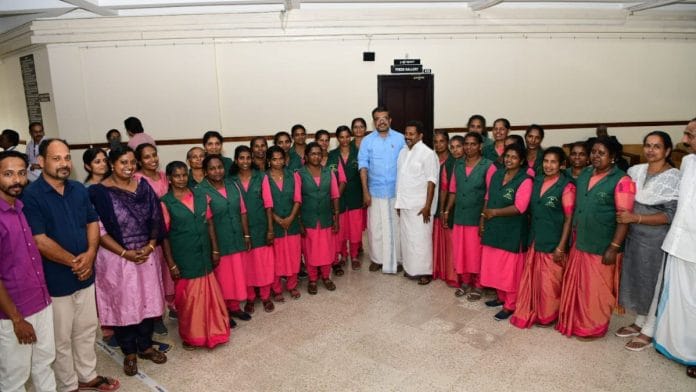Thiruvananthapuram: When Finance Minister Nirmala Sitharaman tabled the Economic Survey in Parliament last week, a small village in Kerala’s Idukki district had much to celebrate.
The report especially praised the panchayat of Erattayar, located about 40 km from the town of Idukki, for its success story in waste management, driven by the empowerment of grassroots workers.
This small rural body’s story is one of persistent efforts to make Erattayar garbage-free by engaging grassroots-level workers and ensuring their welfare.
But the journey was far from easy.
When the Erattayar panchayat rolled out an extensive waste management programme in 2020, one of its major challenges was the lack of grassroots workers to lead the initiative.
Many Haritha Karma Sena members—a group of women engaged in door-to-door waste collection in the state’s local bodies—didn’t stick to their jobs due to a lack of a steady income and insufficient cooperation from the public. Some faced ridicule, with residents even dismissing them as rag pickers.
So, the panchayat decided to step in.
It began by creating awareness about the significance of waste management through individual ward councillors and fostering respect for Haritha Karma Sena members through regular ward meetings.
The panchayat also offered incentives such as additional sources of income and facilities for them to work smoothly.
Today, the panchayat has 26 Haritha Karma Sena members between the ages of 30 and 65 collecting, segregating and processing organic and non-organic waste from over 4,600 households and 500 establishments daily.
“By focusing on waste management, the Panchayat preserves the environment and creates jobs, particularly for women. The strategy involves door-to-door collection, resource recovery, and recycling,” the economic survey report said.
It also commended the efforts of the Haritha Karma Sena members in this initiative.
Also read: 4 yrs after NGT order, 4 states assess their hill cities to strike balance between tourism & ecology
Empowering women
The Haritha Karma Sena members were selected in 2017 in each panchayat as part of the Haritha Kerala Mission, a government initiative for a garbage-free state.
“They were paid very little. So, we trained them to make CIBs (Citizen Information Boards) for the MGNREGA works,” said Anand Sunil Kumar, the president of the panchayat.
CIBs are mandatory boards that provide details of MGNREGA projects in a given area. Previously, these contracts had been outsourced to private firms in Erattayar, Anand said.
Households were also asked to contribute. Every household is charged Rs 50 as a user fee for the collection of non-organic waste once a month. For commercial establishments, the fee is Rs 100.
As a result, Anand said one worker now earns between Rs 10,000 and Rs 25,000 per month.
The panchayat has also tied up with the local unit of Kudumbasree—a poverty eradication programme launched by the state government—to give them medical insurance.
“We also arrange occasional picnics and trips for them. Boarding a flight is one of their dreams. We are also exploring options for the same,” he said.
Renju Jacob, a 41-year-old who joined the team in 2022, says the panchayat’s consistent support has changed the public perception of them drastically.
“Everyone knows the significance of our job now and most of them are now cleaning and segregating their plastic waste even before giving it to us,” she said.
Renju, a homemaker, is a graduate. She said the job has given these women, most of whom were previously unemployed, a steady income.
She said the panchayat took them on a trip to Kerala’s capital Thiruvananthapuram, and showed them the legislative assembly complex in 2023. It also took them to Tamil Nadu’s Dhanushkodi beach in 2024.
“We had only seen the Assembly in the media. It was great seeing the building for real,” she said.
Renju added that the panchayat president has also promised to take them to Bengaluru from Kochi via flight this summer.
Waste management
The Erattayar rural panchayat’s first step towards waste management was the segregation of plastic waste at the source.
Anand said the panchayat now collects 21 types of non-organic waste—including bottles, umbrellas and bags—from the 1st to the 10th of each month, providing additional income for Haritha Karma Sena workers.
Anand said earlier they were paying companies to take the waste as non-segregated waste is treated as legacy waste, or waste that has been improperly stored or collected for years and is often found in landfills, abandoned mines and industrial sites.
Now, companies pay them because they segregate the plastics and treat them in a baling machine.
“For example, if we give them a bundle of books, it doesn’t pay much. But if we separate the pages from its cover, it generates more income as the cover page costs more,” he said.
Household waste is sorted at mini-collection facilities in each ward before being processed in two baling machines installed by the panchayat and a local NGO in 2023. Erattayar collects nearly 4 tonnes of plastic waste each month, Anand said.
The panchayat has also begun collecting biowaste from local commercial establishments, which is then composted into a biofertiliser.
“We have sent it for testing. We will start selling it soon under our brand once cleared,” Anand said.
(Edited by Sugita Katyal)
Also read: Trouble brews for Kerala CM Vijayan over proposed Palakkad distillery. Pick paddy or booze, says CPI






